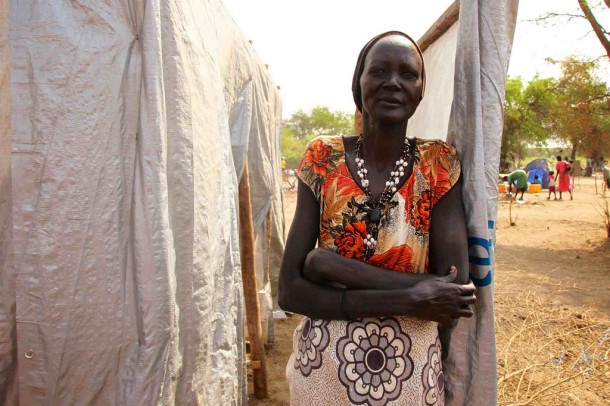Protecting good health in South Sudan
 Martha Nyandeng teaches children how to use latrines and properly wash their hands. Photo: Aimee Brown/Oxfam
Martha Nyandeng teaches children how to use latrines and properly wash their hands. Photo: Aimee Brown/Oxfam
In the midst of conflict and displacement, public health promoters like Martha Nyadeng are helping families stay disease-free.
Aimee Brown is blogging from South Sudan, where Oxfam is responding to the violence that erupted in December 2013. We are rushing food and clean water to crowded makeshift camps and working to prevent disease outbreaks.
Aimee writes: “The violence of the past seven weeks has seen almost a million people pushed from their homes and, at last estimates, over 10,000 dead. … But amidst this grim picture, there are some signs of hope. The violence enacted along ethnic lines that is keeping so many thousands in makeshift settlements and camps is not universal. Anecdotally, almost everyone I have met since I arrived in South Sudan has told me stories of Dinka protecting Nuer friends in their homes, or Nuer host families welcoming Dinka who have fled fighting.
Even if this is the exception rather than the norm, it shows that it is possible to overcome the recent and distant history of hurt, violence, and loss, and find a common path to peace in this, the world’s youngest country. “
Below, Aimee shares the story of Martha Nyadeng, whom she met at a camp for displaced people.
Martha Nyandeng’s toilets could well be the best-kept latrines in the Mingkamen. She takes a quiet pride in her newly acquired responsibility, cleaning the stalls three times a day and patiently demonstrating to children who play by her washstand how to properly wash their hands.
“I take care of this latrine as my own, not for Oxfam. I keep them clean to prevent us from getting sick,” she says.
Martha, a mother and grandmother, fled across the Nile from her hometown of Bor when fighting broke out in December last year. She arrived in Mingkamen, Lakes State, with her six children and grandchildren, and nothing to her name.
“They looted all my things – they took my clothes, my sheets, my bed. Nothing except the house is left,” she said. “I came here with nothing. I just carried my children and my grandchildren. Even the clothes I am wearing were given to me.”
With no savings or possessions to sell, the small income she makes as an Oxfam public health promoter means she can afford food and medical treatment for her children.
“With the money I earn I can help my family,” she says.

Martha’s husband, an officer in the military, was able to pay for the passage of his family safely across the river, but is now far away on the frontline. Martha doesn’t know exactly where he is, and can’t communicate with him.
“I worry for him. There is no network so I can’t speak with him, I just have to pray to god that he is safe,” she says.
Like so many people here, Martha would like to return to Bor as soon as it is safe enough. But until then, she expresses appreciation for the support provided by Oxfam and other humanitarian actors here in Mingkamen. And she enjoys playing a part in helping others.
“People are learning. It’s good because when they come to the toilet they wash their hands and when they go home the bacteria is removed. They’re preventing diseases,” Martha says.
Oxfam employs 78 public health promoters in Mingkamen settlement as part of its hygiene and sanitation work. The promoters share messages about hygiene, such as the importance of hand washing, proper latrine use, and garbage collection, and teach good practices to others living in the area in order to reduce the spread of diseases.